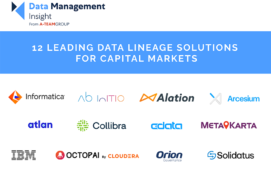
Data strategy has evolved over the past 10 years, but not necessarily in step with new data management technologies, not always in line with the business, and sometimes with little regard to return on investment. A recent CDO panel discussion at A-Team Group’s Data Management Summit NYC, discussed these and other issued during a session entitled ‘Successful data transformation for long term business value’.
Taking a new approach to Summit discussions, panel moderator Julia Bardmesser, Chair, Technology Advisory Council, and Women Leaders in Data and AI, took the role of a sceptical CEO and questioned how the CDOs are proving value. In the spotlight were Andrew Foster, Chief Data Officer, M&T Bank; Yinghua Michelle Zhou, Chief Data Officer, Nuveen; JC Lionti, Managing Director & Chief Data Officer – Americas, Mizuho; and Elena Alikhachkina, Global Data Analytics & Technology Executive.Data strategy
Bardmesser set the scene noting that Big Data, bespoke projects, cloud and AI were all supposed to solve data management problems as data strategy evolved, but none provided all the answers. So how is data strategy working today and what is proving successful?
With three of the CDOs relatively new to their posts, one commented: “When taking the CDO role, strategy was about defensive data management, regulation and bridging technology and the business. We still do that, but the strategy has changed to deliver value and make tech buzzwords relatable to the rest of the company.”
Talking about AI, Bardmesser questioned the speakers and audience about whether they have Hadoop or blockchain at home, causing a wave of laughter, and leading her to point out that AI, in contrast, is everywhere, at home and in the enterprise, and is here to stay. “We can’t avoid the AI revolution, AI is used by consumers, but we need to use it on an ROI basis,” said one CDO. Another noted that it will change data strategy.
The role of data
Considering how delegates view data in their organisation, an audience poll question showed 49% saying it is a fundamental capability that supports key strategic business growth objectives, 21% a fundamental capability that supports operational efficiency, 16% a fundamental capability that supports regulatory objectives, and 12% suggesting data is an asset that can be monetised.
The panel favoured the option of data as a capability that supports key strategic business growth objectives, with one speaker, saying: “We need to align with the organisation’s needs. The business doesn’t care about CDEs, although these will be used in developing a perfect data product.”In terms of demonstrating value from data strategy, another speaker explained: “When we proposed a data governance programme, we needed to show value and accountability. In most cases, this is not a data problem but about responsibilities and people, who are often overlooked.” Similarly, another added: “Big Data, cloud and blockchain are supposed to offer business transformation, but data transformation is about people and processes. Show me processes that are painful and we will give you the tools to ease the pain.”
Data culture
Bringing in the audience again, Bardmesser launched a poll question asking, ‘What are the challenges in developing a strong data culture at your organisation?’ Some 27% of delegates noted low levels of data literacy across the organisation, 24% no well-defined and streamlined processes for data access, 21% mistrust and lack of confidence in data, 14% no single source of truth for the data, and 13% lack of buy-in for data from senior management.
Responding to the poll results, a CDO said: “Fundamentals such as data lineage and CDEs are called that for a reason. They are all valuable, but you need to remove friction across the organisation caused by people who are not data people, to make the most of them and get to a trusted point.” Another added: “We need to be consumer centric. In the past products have had a cost, now they need to have value.”
Coming to the end of the session, Bardmesser asked the CDOs what they need to solve the problems they face. Magic was a common response much to the amusement of the audience. More practical suggestions included “a tool that links data, makes a catalogue and shows me how everything works”, “something that makes people interested in what we do”, and “a business and IT tool that provides an end-to-end view of data in a way business users can understand”.
Subscribe to our newsletter




